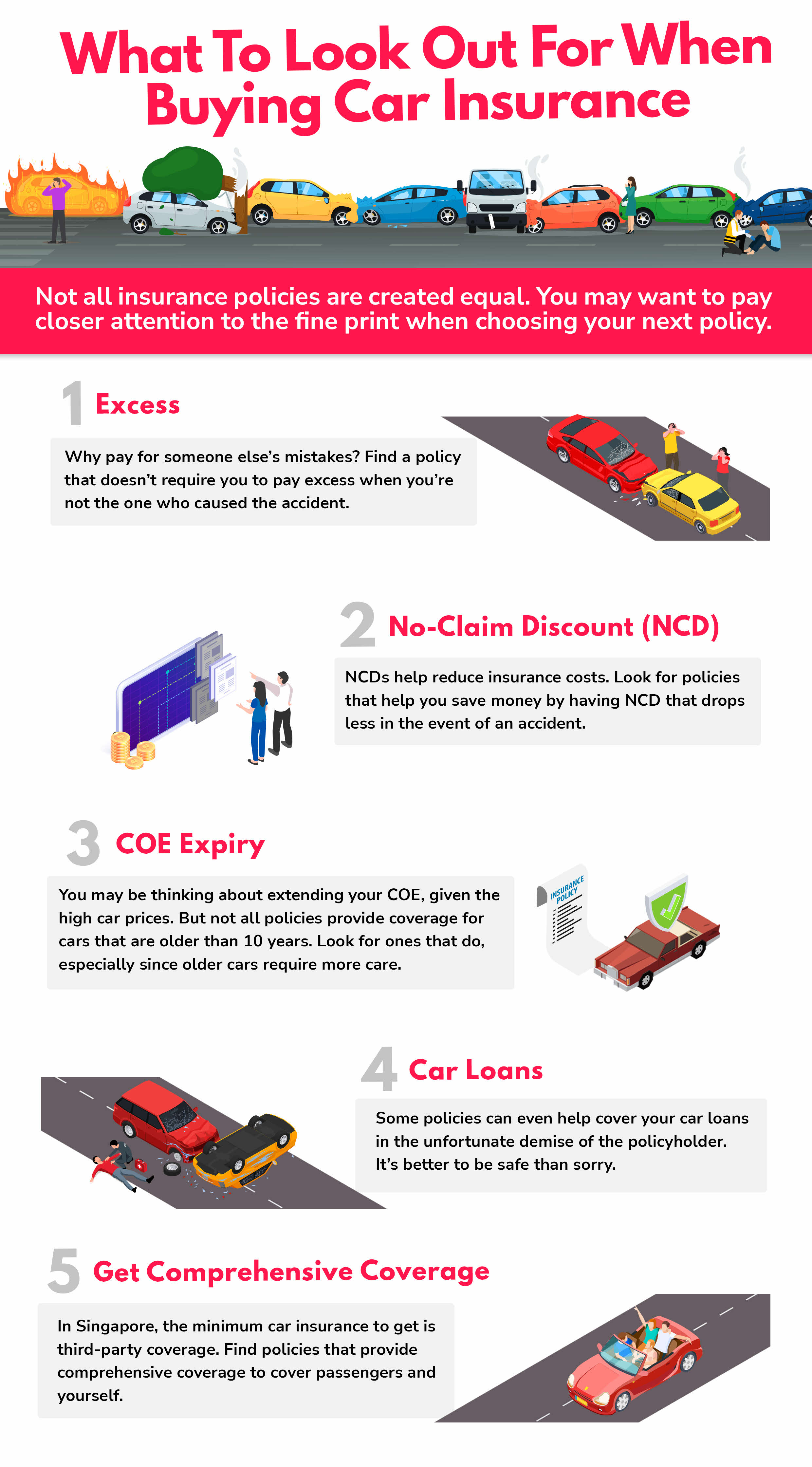A guide to buying car insurance
![]()
If you’ve only got a minute,
- Select a car insurance policy that best suits your needs.
- Look for a policy that lowers or even waives excesses when you are not at fault.
- Find policies that provide comprehensive coverage to cover passengers and yourself.
![]()
When it comes to buying a car, most people tend to focus on how much the new ride costs. And with Certificate of Entitlement premiums surging past $100,000 recently, it’s easy to ignore everything else.
But owning a car is more than just paying for the vehicle. Ownership comes with a range of other expenses, such as maintenance costs, taxes and, arguably the most important, insurance premiums.
All car owners must ensure they have sufficient insurance policy before driving. However, many simply buy the first one that is offered to them. As always, the devil is in the details.
There is no one-size-fits-all solution, but here are four things to take note of when picking a car insurance policy that best suits your needs:
1. Check the insurance excess
Accidents happen. But it is particularly irksome when the accident is not of your doing and yet your insurer makes you pay for excess – the amount you pay when claiming on your insurance, which is typically the case.

So look for a policy that lowers or even waives excesses when you are not at fault. You should not have to pay for someone else’s mistake.
2. Compare no claim discount plans
A No Claim Discount (NCD) which insurers give policyholders who do not make any claim for a given amount of time, can mean substantial savings in insurance premiums. However, the moment a claim is made when you are at fault in an accident, your NCD could drop by a massive 30%. Earning back this 30% on your NCD will require a three-year claims-free period.
But fret not – you may add an NCD protector to your policy so that your NCD can be protected for one claim, or consider policies that reduce your NCD by a lower percentage. By doing so, you don’t pay a hefty penalty for a one-off mistake.
3. Consider a policy that covers older cars
A Certificate of Entitlement (COE) allows you to register a vehicle and use it for 10 years. After that, you can choose to deregister your vehicle or renew the COE – an increasingly popular option given the current sky-high COE prices. However, the coverage offered by most car insurance policies here ends after the 10-year mark.
If you want to cut your expenses by renewing your COE instead of buying a new car, look for a policy that covers older vehicles.
Shopping for motoring insurance requires due diligence to ensure that you get the best deal for your car and profile.

The good news is that DriveShield could be the most suitable for you. The unique plan, which is a tie-up with leading insurance provider Singlife, covers all the bases. It offers a waiver of excess if the policyholder is not at fault while promising only a 10% drop in NCD if the customer is at fault.
DBS DriveShield is also an all-inclusive plan that covers the new wave of electric cars, older cars up to 15 years old and everything in between.

In addition, with DriveShield’s Enhanced Plan, its Gap Cover feature covers your outstanding car loan in the event of a total loss, while the Loan Protector feature does the same if the policyholder passes on. Similarly, if you choose the Enhanced Plan, you can also get on-site accident reporting and transport for you and your passengers to any destination in Singapore from the accident location.
The best part? It’s one of the most competitively priced car insurance plans in the market.
Whether you are in the market for a new car or looking to renew your insurance policy, check out DBS DriveShield – don’t miss our special discount!
Disclaimers
T&Cs apply. Protected up to specified limits by SDIC. This insurance policy is underwritten by Singapore Life Ltd.
Ready to start?
Get a quote online for DriveShield
Alternatively, check out NAV Planner to analyse your real-time financial health. The best part is, it’s fuss-free – we automatically work out your money flows and provide money tips.








That's great to hear. Anything you'd like to add?
We're sorry to hear that. How can we do better?